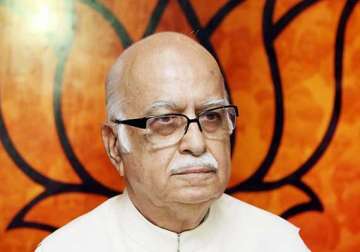New Delhi, Mar 25: Senior BJP leader L K Advani today said the collegium system of appointing Supreme Court judges should be revisited to include the Executive in the process as reports of corruption, nepotism, favouritism and other ills have been gaining ground in the judiciary.
In his latest blog posting, Advani cited views of retired Supreme Court judges Rumal Pal and J S Verma as well as the Law Commission report to insist that the present collegium system- comrpising of Chief Justice of India and the four senior-most judges of the Supreme Court- is not adequate.
Advani suggests that the Executive too should have a role in appointment and transfer of judges to bring in checks and balances.
“These days the issue most discussed in the country is corruption. There was a time when all talk of corruption was related only to the Executive- politicians and bureaucrats. No one talked of corruption in the judiciary, certainly not in the higher judiciary. Things have changed in recent years,” he said.
Advani quotes Justice (retd) Pal who said in a memorial lecture that seven deadly sins afflict the judiciary and listed corruption as one of them.
“Lately, a perceptible change has come about in the standards of judges selected,” he said.
The BJP leader said Justice (retd.) Verma had also suggested that there is a need to do a rethink on the present system of appointing judges.
Advani referred to Law Commission's 214th report, submitted in 2008, which states: “In all other Constitutions either the Executive is the sole authority to appoint judges, or the Executive appoints judges in consultation with the Chief Justice. The Indian Constitution has followed the latter method.”
Justice Verma states that the role of the Executive has been “completely eliminated and excluded”.
Advani cites an observation of the Law Commission which said: “The Indian Constitution provides a beautiful system of checks and balances under Articles 124 (2) and 217 (1) for the appointment of judges of the Supreme Court and the High Courts where both the Executive and the Judiciary have been given a balanced role. It is time the original balance of power is restored.”
The BJP leader maintains that appointments to high judicial offices in the world's largest democracy must be transparent, fair and based on merit. He says Justice Pal had termed the appointment process of Supreme Court judges “possibly the best kept secret of the country”.
Justice Pal argues that the “mystique” of the process, the small base from which the selections were made and the “secrecy and confidentially” ensured that the “process may, on occasions, make wrong appointments and, worse still, lend itself to nepotism”.
She further maintained that “an indiscreet comment or a chance rumour” was enough to rule out a person's perceived suitability for the post.
“Friendships and obligations also sometimes colour recommendations” Justice Pal said.
Advani refers to the weak judgements given during the 1975-77 National Emergency and wonders how many in the judiciary today would react today to a situation similar to that which arose in June, 1975.
“Would as many as nineteen judges of High Courts muster courage to invite the wrath of the Executive by deciding in favour of MISA detenus? I frankly doubt it,” he said.
Latest India News
